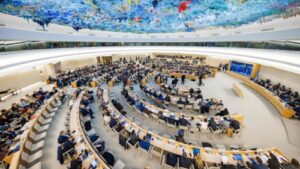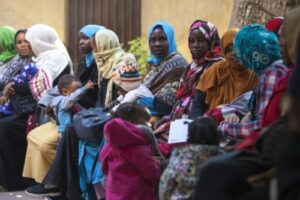
The National Interest Foundation Newsletter
Issue 171, December 1, 2022
Welcome to our NIF Newsletter. In this week’s headlines: the United Nations Human Rights Council votes to establish a fact-finding mission for investigating Iran’s repressive crackdown on anti-government demonstrations, a new Human Rights Watch report outlines how Egyptian authorities under the El-Sisi government have failed to protect vulnerable refugees and asylum seekers from sexual violence, and Turkish officials vow to launch a ground invasion into northern Syria.
Fact-Finding Mission on Iran Crackdown

Government pushback on protestors in Iran has escalated in recent weeks, prompting the United Nations Human Rights Council to vote in favor of conducting an investigation. (Photo from Getty Images)
United Nations Human Rights Council Votes to Establish a Fact-Finding Mission for Investigating Iran’s Repressive Crackdown on Anti-Government Demonstrations
Over two and a half months after 22-year-old Iranian woman Mahsa Amini died under questionable circumstances in police custody, anti-government protests have raged on in Iran, prompting the United Nations Human Rights Council to vote to establish a fact-finding mission for investigating the government’s repressive crackdown. Recent figures estimate the death toll to be at least 300 based on UN reports, and 440 or more according to other sources. Particularly concerning is the fact that of these, between 40 and 60 have been children, with Amnesty International and local human rights groups stating that the majority have been killed since November 15th, suggesting an alarming increase in suppressive violence as of late. UN High Commissioner of Human Rights Volker Türk indicated that Irani forces have utilized “live ammunition, birdshot and other metal pellets, tear gas, and batons,” despite claims from Iran to the contrary. Many of the tens of thousands of civilians that have been detained face an incredibly bleak scenario – as demonstrators have routinely been denied lawyers and given lengthy and severe sentences. Troubling accounts of violence and abuse against protest prisoners have also come to the forefront.
Responding to the actions taking place in Iran, the United Nations Human Rights Council was called to a special session to vote on launching a fact-finding mission. Iran attempted to pacify the UN before the meeting by saying that they would conduct their own investigation, but the offer fell on deaf ears. At the session, Iran representative Khadijeh Karimi, Deputy of the Vice President for Women and Family Affairs, argued that Western nations had no right to intervene in internal Irani affairs, especially given the unilateral sanctions placed on Iran that she stated were detrimental to the average citizen’s life. Speaking on behalf of the UN, Special Rapporteur on the Situation of Human Rights in Iran Javaid Rehman expressed that a fact-finding mission was required to address the uptick in violence, especially against children. He also broached the topic of lies and misinformation he believes the government is spreading regarding the hundreds of deaths, and said that the strategy is to indiscriminately arrest as many protestors as possible. Ultimately, the results of the vote were 25 for and 6 against, with 15 abstaining. The move is an unprecedented one in the history of the UN’s dealings with Iran, and has been praised by prominent rights groups such as Amnesty International. For the first time, there will be a mechanism by which state abuses may be documented and cited in international court.
Earlier this week, Irani Foreign Ministry Spokesman Nasser Kanani shocked no one with his announcement that Tehran will not cooperate with the UN investigation, saying that the probe is of a “political” nature. Iran has refused to back away from their conviction that the protests have nothing to do with the death of Amini or women’s rights, and are purely about overthrowing the government, while also blaming terrorist activity – such as the mass shooting at Shah Cheragh Shrine in October – on the protests as well. Whether the investigation will continue to go forward remains to be seen.
New Human Rights Watch Report on Egypt

The report aims to shed light on the disturbing trend under El-Sisi authorities in Egypt. (Photo from UNHCR)
New Human Rights Watch Report Outlines How Egyptian Authorities Under the El-Sisi Government Have Failed to Protect Vulnerable Refugees and Asylum Seekers from Sexual Violence
A new Human Rights Watch (HRW) report has drawn attention to how Egyptian authorities under the El-Sisi government have failed to protect vulnerable refugees and asylum seekers from sexual violence. The findings delve into the disturbing trend which has become far too commonplace in recent years, as many female asylum seekers and refugees have fallen vulnerable to sexual abuse and assault. The numbers show that sexual and gender-based violence in Egypt’s refugee communities is especially pervasive, with accounts of more than 2,300 refugees who have experienced this in 2021 alone. In their latest report, HRW documents 11 particularly alarming incidents of sexual violence, including ones with children. The evidence uncovers how the victims who went to authorities were often told that they could not file incident reports, and some were even assaulted by the officers that were assigned to help them. Insufficient police responses into sexual violence accounts and authorities’ failure to properly investigate and offer accountability were shown to be prevalent occurrences.
Egypt has no national asylum system, and thus, they do not relocate refugees to camps but instead send them to live in urban areas. Many refugee communities are located in poorer neighborhoods and areas with high crime rates, and this has been pointed to as a notable factor which exacerbates the risk of refugees being victimized – as attackers view them as easy targets based on their perceived vulnerability linked to poverty and legal status. The government has allowed the UNHCR to take control of the residency process, however, ongoing barriers to obtaining permits have left many asylum seekers and refugees undocumented, further increasing their risk and vulnerability to exploitation, abuse, and violence. Unfortunately, HRW’s report is far from the first time that Egyptian authorities have been documented of failing to provide adequate protection for asylum seekers against egregious human rights abuses. El-Sisi authorities themselves have been accused of engaging in physical abuse and forced labor practices.
Observers have pointed out that refugees and asylum seekers should hold the right to report crimes with no fear of reprisal to their immigration status. HRW officials have also highlighted the troubling combination of pervasive sexual violence, a failure to protect against this and deter future abuses, and an absence of justice and accountability to punish offenders. The issue of major human rights abuses, particularly against women, has been a tangible theme under the El-Sisi government. Rights activists have documented an increase in concerning practices such as female genital mutilation, forced marriages, and child marriages. These have been highly criticized for their severe negative health, psychological, and emotional ramifications on victims.
Unease regarding the overall state of human rights in Egypt under the El-Sisi government has been a consistent trend in preceding years. The current government has instituted a brutal crackdown on any groups or individuals that they deem to be political opponents and dissidents. Rights groups often document how Egyptian security forces act with impunity, routinely conducting arbitrary arrests, forced disappearances, and torture against real or suspected political activists, as well as ordinary citizens. As a result, HRW’s new report is merely the latest evidence of the array of human rights abuses that have plagued Egypt under the El-Sisi government.
Turkey Vows Ground Invasion of Northern Syria

Some experts point out that the United States has long been wary of involving itself in Turkey-SDF tensions, and is even less likely to do so now given the leverage that Turkey has gained as a key U.S. ally in the Russia-Ukraine conflict. (Photo from AP)
Turkish Officials Vow to Launch a Ground Invasion into Northern Syria
Since the spring of 2022, Turkish President Recep Tayyip Erdogan has hinted at the notion of attacking the Kurdish YPG, which is headquartered in northern Syria and the largest faction of U.S. ally, the Syrian Defense Forces (SDF). Turkey has warred with Kurds within Turkey for many years and has periodically taken the offensive. Now, it looks as though they plan to do so once again, following the recent Istanbul bombing that Ankara claims was conducted by the YPG and a subsequent slew of Turkish air strikes in retaliation. In the midst of the strikes, Erdogan swore that ground attacks were to follow. The SDF has since corroborated Turkish claims by saying that activity has increased along the border. Most analysts are suggesting that Erdogan is using the Istanbul attack as an excuse for finally executing his plan to invade Syria, and in doing so, mobilizing nationalists to vote for him in his 2023 bid for re-election. In the face of the threat, SDF commander Mazloum Abdi has called on the U.S. to use its influence to prevent a Turkish incursion. However, Washington will do no such thing, according to anonymous government insiders interviewed by The Washington Post. The U.S. has done its best to assure the SDF that they did not greenlight airstrikes and that Turkey will not invade, but is unlikely to do anything in the event that Turkey does follow through on its threats. The U.S. and others have become reliant on Turkey in handling the Ukraine-Russia conflict, as Turkey has taken responsibility for peace talks and the arrangement allowing safe passage of grain to address world food shortages. Thus, Erdogan has the U.S. over a barrel, and the SDF is in a vulnerable position. Meetings have been reported between Turkey and Syrian President Assad as well, who traditionally has helped the SDF keep Turkey out of Syria in spite of efforts to reclaim the country from rebel groups.
Still, there are factors at play that may convince the U.S. to take greater action. Most significant among these is the presence of U.S. soldiers that reside with the SDF forces, as they continue to battle ISIS together. Turkish airstrikes got within 130 meters of some U.S. soldiers. If any are harmed, or perhaps even put in harm’s way, the U.S. may take direct action against Turkey. Also important is the SDF’s decision to put a hold on efforts to combat ISIS until the situation with Turkey has been handled. Being that fighting ISIS is the reason put forth that U.S. soldiers are there, unchecked growth of ISIS during this time is certainly a chief concern. Aside from ISIS, the U.S. was one of the parties who oversaw a 2019 agreement between Turkey and Syrian Kurds that Turkey would not enter Syria in exchange for the removal of SDF forces from border areas. Clearly, a Turkish incursion into Syria would violate this agreement, but it can be argued that the SDF has not properly vacated the area as promised as well.
At the end of the day, it is likely that only an assault on U.S. soldiers will convince the United States to come to the SDF’s aid. The U.S. has been wary of taking a side in the dispute between Turkey and the SDF for years, and is less likely to do so now given the leverage that Turkey has gained. Though the U.S. insists that it has spoken to Erdogan’s government privately, it is likely that they will not make a public statement condemning what Turkey plans to do, instead choosing to monitor the situation from afar and hope that “all parties [will] de-escalate tensions.”
Enter the text or HTML code here
